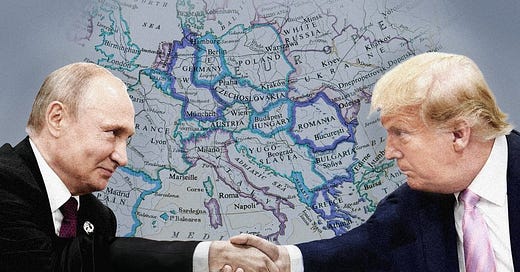Dear reader,
This week, I look at what US-Russia talks mean for Ukraine and Europe, explain why land matters in the Israeli-Palestinian conflict, and answer your questions on Trump’s bromance with Putin, Gaza peace odds, and Bolsonaro’s indictment. Plus, your weekly rec from my dog Moose.
Let’s get to it,
- Ian
Trump’s dealmaking with Putin leaves Ukraine and Europe with nowhere to turn
Less than a month into Donald Trump’s second term, talks to end the Ukraine war have finally begun. For the first time since Russia’s full-scale invasion in 2022, American and Russian officials sat down in Riyadh yesterday to negotiate not just the fate of Ukraine but the future of Europe … without Ukraine or Europe at the table. It’s no wonder the Kremlin left the four-and-a-half-hour meeting with a spring in its step.
Before negotiations had even started, Team Trump handed Vladimir Putin several of his core demands without securing a concession in return. The US ruled out NATO membership for Ukraine, rejected the possibility of deploying US peacekeeping forces, and acknowledged Russia’s territorial gains as the baseline for negotiations. Further, the talks excluded Ukrainian President Volodymyr Zelensky and European allies, signaling that the fate of Ukraine and Europe will be decided by Washington and Moscow.
🔔 Subscribe to GZERO Media for free to get timely global analysis and news. For exclusive content and the chance to engage with a community of thinkers, and be a part of the conversation shaping our world 🔔
After Tuesday’s meeting, President Trump went as far as reiterating Moscow’s call for elections in Ukraine, reportedly as a pre-condition for a final agreement, and blamed the Ukrainians for starting the war. The Kremlin’s media machine hasn’t been this happy since the early days of the 2022 invasion, when they briefly thought Kyiv would fall without a fight.
It’s hard to articulate how extraordinary the events of the past week have been. The fact that in the 21st century, Russians and Americans are negotiating Ukrainian elections and European security without either party in the room is unprecedented since the days of the Cold War.
Despite Zelensky’s and European leaders’ best efforts to get on Trump’s good side, the US is no longer a reliable or a good-faith partner. If Vice President JD Vance’s speech at the Munich Security Conference denouncing European democracy did not make that clear enough, Treasury Secretary Scott Bessent’s attempt to shake down Zelensky for 50% of Ukraine’s present and future mineral wealth revenues – not in exchange for future US support but as payment for past military aid disbursed during the Biden administration – should have. These terms amounted to a higher share of Ukrainian GDP than the reparations imposed on Germany by the Versailles Treaty.
Whether or not you’re a fan of President Zelensky, you should be able to agree that the US trying to force an election in a foreign democracy during wartime – when it can’t possibly be held safely and securely – against most Ukrainians’ wishes (including much of Zelensky’s opposition) and in violation of the Ukrainian constitution is unacceptable. Doing this not to advance American interests but to further the imperialist agenda of a war criminal like Putin is a stain on the United States and its role in the world.
Ukrainians now recognize there is a growing risk that Trump will strike a ceasefire deal with Putin on terms they cannot accept. But they still have agency: At the end of the day, no ceasefire will hold if Ukrainians refuse to stop fighting, and they will only lay down arms if they receive real security guarantees that Russia won’t be able to seize more territory in the future. Yet Trump has already said that the US will not be on the hook for deploying peacekeeping troops, leaving Ukraine to rely on Europe for post-war security (not to mention reconstruction).
Here’s the rub: Most Europeans will only agree to deploy peacekeeping forces to Ukraine if the US credibly commits to provide a military backstop (not necessarily troops but yes logistics, intelligence, and air support) in the event of a Russian attack, and the Trump administration is reluctant to offer that. Yet without a tripwire along the lines of Article 5 (i.e., not contingent on Europe’s political and economic alignment with the Trump agenda), a European security guarantee would be too weak to effectively deter Russia from using a ceasefire to rearm and trying to take more Ukrainian land in the future.
Kyiv is working furiously with European leaders to craft a plan they can present to Trump before he meets with Putin. They all recognize that if they don’t move fast, the US and Russia will cut a deal on their future over their heads. But Europe’s haplessness was on full display at an emergency meeting convened by French President Emmanuel Macron in Paris on Monday. UK Prime Minister Keir Starmer pledged to send troops to Ukraine – but only with US backing, which isn’t coming. Germany’s lame-duck Chancellor Olaf Scholz dismissed the idea of peacekeepers as “premature.” Poland, despite being on the front lines, refused to commit troops, citing its own security needs. The Baltics and Nordics would be willing to commit some troops, as would the French, but nowhere near enough – or fast enough. Europe’s inability to act decisively underscores a deeper problem: Without American leadership, the continent is paralyzed.
For Ukrainians, the stakes could not be higher. They may soon be forced to choose between accepting a loss of territory without US-backed security guarantees for the future and continuing to fight without American support – both of which would all but ensure an even bigger Russian win down the line. The irony is that Putin’s original theory of victory always hinged on undermining support for Ukraine and dividing the transatlantic alliance. After three years of failure on the battlefield, Trump’s return to the White House may finally deliver exactly what the Kremlin wanted all along.
💬 Got a question you’d like answered? Or thoughts on anything you’ve read so far? Let me know in the comments below—I’d love to hear from you!
Putin isn’t just seeking a deal on Ukraine – he wants an overhaul of the European security order. Not only has he made it clear that he won’t accept any Western boots on the ground in Ukraine (even as peacekeepers), but the broader security demands he made in his 2021 ultimatum are back on the table, including the removal of NATO troops from Eastern Europe and former Warsaw Pact countries. And Trump, who sees Europe as less ally than supplicant, seems open to delivering.
If Trump agrees to withdraw US troops and missile defenses from the Baltics, as he and his advisors have hinted in the past, frontline states would be left exposed to an emboldened Russia that has shown no qualms about using military force to achieve its expansionist goals. Just like a European security guarantee for Ukraine would be fairly useless without a US backstop, Europe would be ill-equipped to deter Russian aggression if America pulled out of NATO.
Europeans are taking the challenge seriously, but the continent’s defense spending has lagged for decades, and its military capabilities are fragmented and underfunded. Even if a politically divided Europe were to ramp up its collective security investments overnight, it would take years to build the kind of deterrence that NATO provides under American leadership – years that Europe does not have. After over a decade of complacency, it may be much too late for them to get their act together.
Europeans suddenly find themselves fighting a two-front war – facing both Russian security threats and American anti-European hostility. When the US defense secretary declares that “stark strategic realities prevent the United States from being primarily focused on European security,” that’s diplomatic speak for “you’re on your own.” But the problem goes beyond the US no longer being a reliable partner in the fight against Russia or even a last-ditch security guarantor. The transatlantic alliance itself is in trouble when the US vice president says the biggest threat to Europe comes “from within” and his Euroskeptic Trump administration is actively threatening to interfere in European democracies, undermine the European economy, weaken European unity, and even – in the case of Greenland – violate European sovereignty.
Eighty years after the leaders of the US, UK, and Soviet Union carved up post-war Europe into spheres of influence at Yalta, Trump and Putin are poised to do the same. The Russians would see their European territorial ambitions codified, the Americans would secure their own interests, and each side would divide the Arctic – leaving the rest of the world to fend for itself. This is not just a betrayal of Ukraine and Europe – it is the unraveling of the world order America built after World War II.
As we warned in Eurasia Group’s Top Risk for 2025, we are witnessing a return to the law of the jungle, a G-Zero world where might makes right. I’d love to say “I told you so,” but this is one place I wish had been wrong.
📢 Agree, disagree, or somewhere in between? Share this post and let the debate travel.
A message from our sponsor Walmart
"Walmart has helped us lead the trend of non-alcoholic beer"
Walmart is fueling American jobs and strengthening communities by investing in local businesses. Athletic Brewing landed a deal with Walmart in 2021. Since then, co-founders Bill Shufelt and John Walker have hired more than 200 employees and built a150,000-square-foot brewery in Milford, CT. Athletic Brewing is one of many US-based suppliers working with Walmart. By 2030, the retailer is estimated to support the creation of over 750,000 US jobs by investing an additional $350 billion in products made, grown, or assembled in America. Learn more about Walmart’s commitment to US manufacturing.
Why land matters in the Israeli-Palestinian conflict, explained
What does it matter where you live? It’s a question as old as humanity. Our ancestors first traveled the world as nomads, but once we started farming and putting down less literal roots, the land beneath our feet became a crucial part of our identity.
A handful of millennia later, it’s still the question driving the Israeli-Palestinian conflict. Why must Israelis live in what they call Israel? Why must Palestinians live in what they call Palestine? After all, these lands in question are not rich in oil reserves or gold deposits. For one, there’s the “angels and gods and saints and prophets” that live there, as Yuval Noah Harari told me on GZERO World. But there’s also a shared history of displacement.
Now, President Trump is telling Gazans to leave their ancestral homes as he proposes to take over the Gaza Strip and turn it into “the Riviera of the Middle East.” To the thousands of displaced Palestinians, he asks: What does it matter where you live? And honestly, it is a fair question to ask (though he’s not exactly posing the same question to Israeli settlers on the West Bank).
Yet, if the region’s bloody history has shown us anything, it’s not so much asking the question that matters as who gets to answer it.
Watch me explain why here.
You ask, I answer
This week, you asked:
What is Trump’s long-term play with apparently treating Putin like a friend rather than an adversary?
How likely would the release of all remaining Israeli captives as proposed by Hamas be to actually lead to a permanent truce in Gaza?
Does Bolsonaro's indictment for an alleged coup plot signal tough times ahead for Brazil?
Check out my answers to your questions in the latest World in 60 Seconds.
Moose’s treat of the week
“The death of capital letters,” by Nyima Jobe, a fascinating look at how Gen Z’s embrace of lowercase writing reflects a cultural shift away from traditional authority and toward authenticity. Turns out my decades-long commitment to never touching the shift key except under professional duress (looking at you, GZERO editors) wasn’t weird – it was just ahead of the curve.











It was clear to me that Biden should have placed a substantial number of US troops in Ukraine before the start of the war and dared Putin to kill a single US soldier. Everyone knows that the US can pivot to a war footing in a heartbeat if the old communist country harms their troops. Since then the endless hand-wringing, as Ukraine defends all peace-loving countries, was a sad display of indecision. Now what was a predictable start is in the hands of Putin’s not so secret ally who wishes to help all dictators so he can become one of them. Ukraine and Europe plus Canada and all others who wish to be on the right side of history have to stay in the fight and show Putin that 20th century weapons are no longer a match for drones. If American help is no longer, Ukraine should target every military target and Putin’s hideouts wherever they may be. Let the Russians learn they are at war and if Putin tries strategic nukes, Europe should give the same to Ukraine. Burying heads in sand didn’t work with Hitler surely we learned that lesson.
Donald J. Trump betrays everything our country represents!
Donald J. Trump betrays all the soldiers who died defending our nation from the fascism he embraces and embodies!
We need to elect strong leaders who can get rid of Trump once and for all!